Ethical Considerations in ANZ Bank's Profit-Driven Business Model
VerifiedAdded on 2023/06/03
|15
|4608
|481
Report
AI Summary
This report provides a comprehensive analysis of the ethical considerations surrounding ANZ Bank's business practices, particularly focusing on the 'fee for no service' policy and the prevalence of a greed culture. It begins with an overview of ANZ Bank and the findings of the Royal Banking Commission, highlighting the unethical actions and their impact on stakeholders. The report then delves into the bank's operations through the lens of stakeholder theory, corporate governance, corporate social responsibility, and creating shared value. Furthermore, it analyzes the bank's actions using ethical frameworks like consequentialism, libertarianism, and Rawlsian justice. The findings reveal that ANZ Bank's actions were not only unethical but also detrimental to its long-term prospects. Finally, the report concludes with recommendations for the bank, including a focus on corporate social responsibility, increased transparency, and an improved work culture, all aimed at fostering ethical behavior and sustainable business practices.
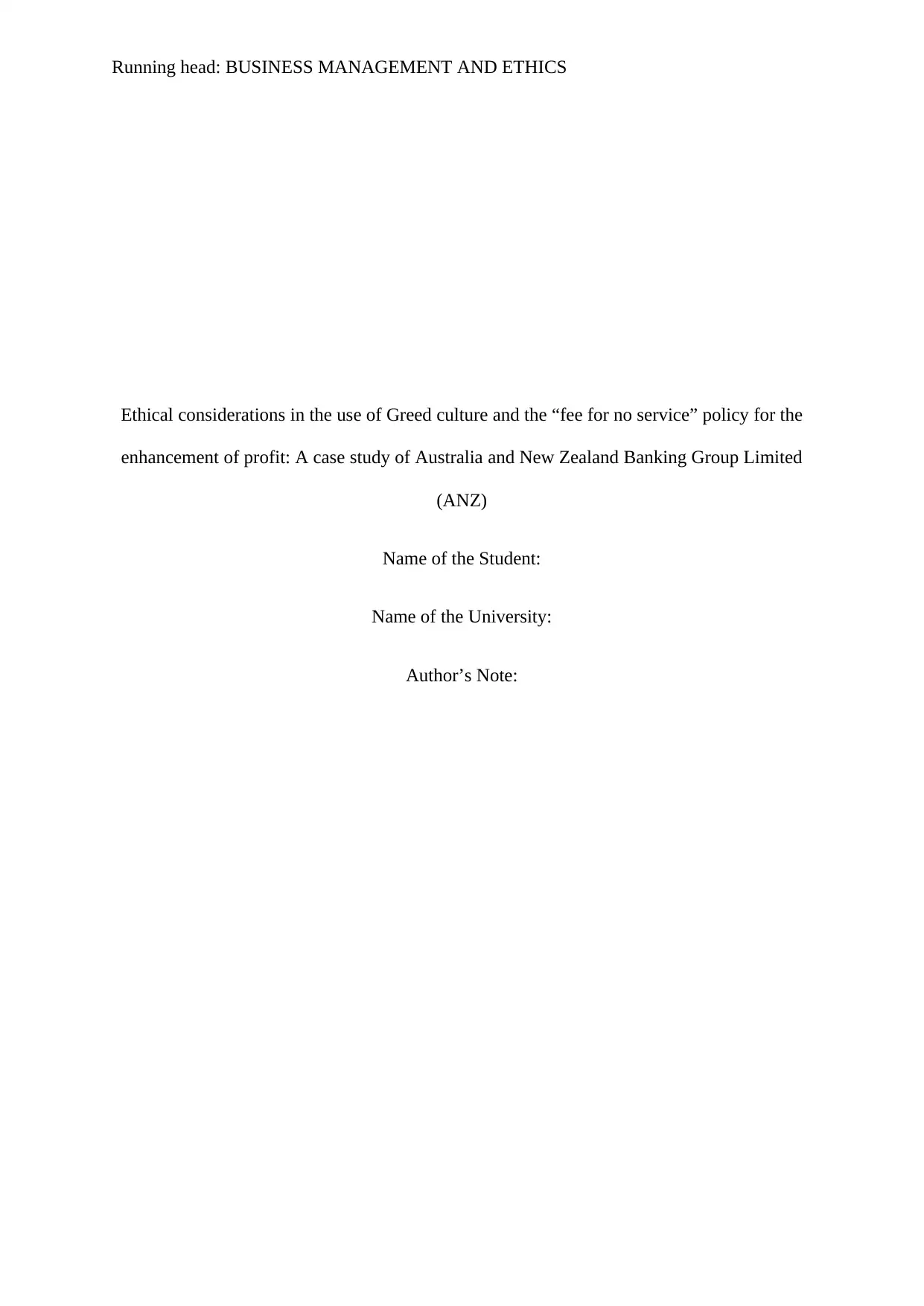
Running head: BUSINESS MANAGEMENT AND ETHICS
Ethical considerations in the use of Greed culture and the “fee for no service” policy for the
enhancement of profit: A case study of Australia and New Zealand Banking Group Limited
(ANZ)
Name of the Student:
Name of the University:
Author’s Note:
Ethical considerations in the use of Greed culture and the “fee for no service” policy for the
enhancement of profit: A case study of Australia and New Zealand Banking Group Limited
(ANZ)
Name of the Student:
Name of the University:
Author’s Note:
Paraphrase This Document
Need a fresh take? Get an instant paraphrase of this document with our AI Paraphraser
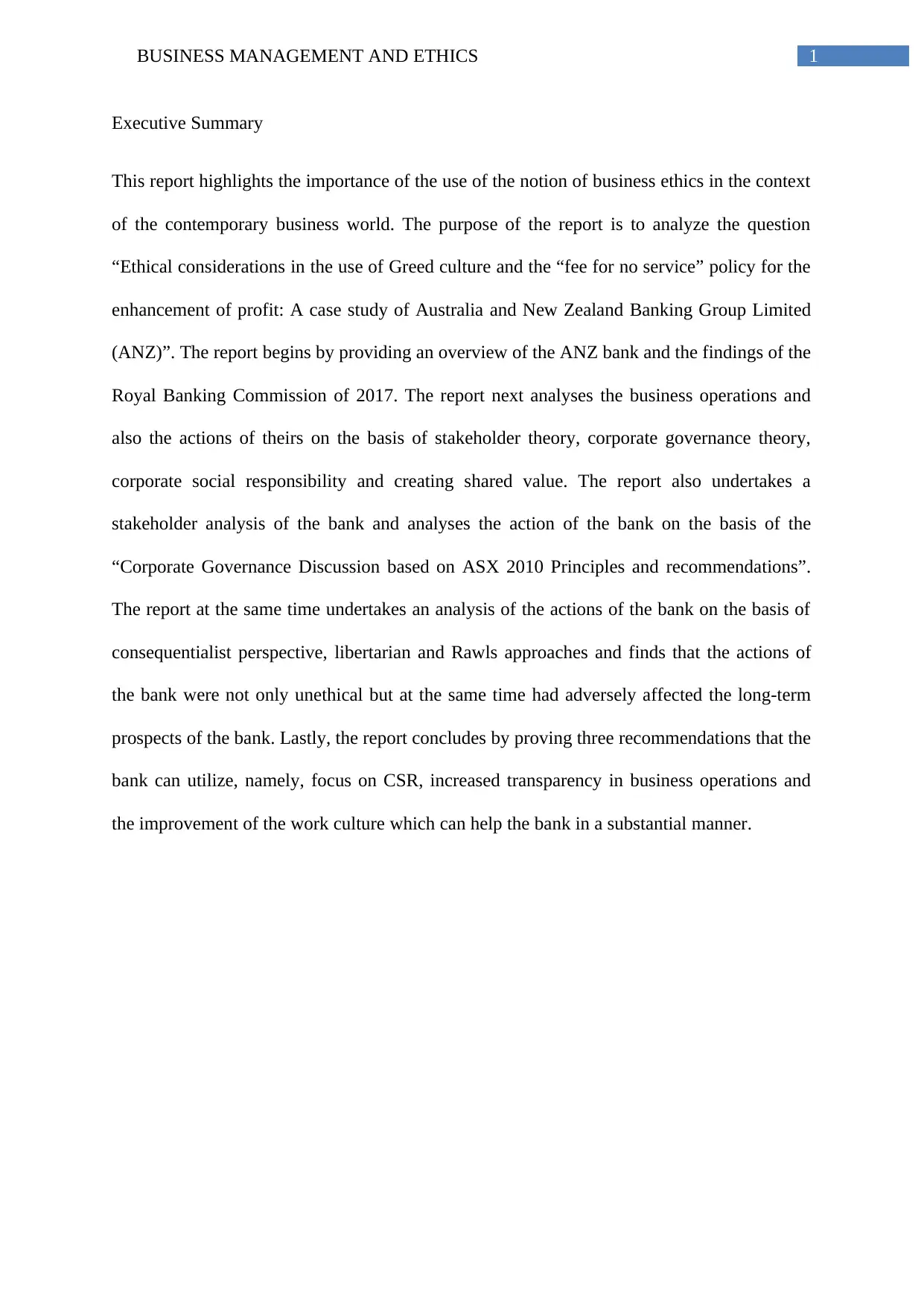
1BUSINESS MANAGEMENT AND ETHICS
Executive Summary
This report highlights the importance of the use of the notion of business ethics in the context
of the contemporary business world. The purpose of the report is to analyze the question
“Ethical considerations in the use of Greed culture and the “fee for no service” policy for the
enhancement of profit: A case study of Australia and New Zealand Banking Group Limited
(ANZ)”. The report begins by providing an overview of the ANZ bank and the findings of the
Royal Banking Commission of 2017. The report next analyses the business operations and
also the actions of theirs on the basis of stakeholder theory, corporate governance theory,
corporate social responsibility and creating shared value. The report also undertakes a
stakeholder analysis of the bank and analyses the action of the bank on the basis of the
“Corporate Governance Discussion based on ASX 2010 Principles and recommendations”.
The report at the same time undertakes an analysis of the actions of the bank on the basis of
consequentialist perspective, libertarian and Rawls approaches and finds that the actions of
the bank were not only unethical but at the same time had adversely affected the long-term
prospects of the bank. Lastly, the report concludes by proving three recommendations that the
bank can utilize, namely, focus on CSR, increased transparency in business operations and
the improvement of the work culture which can help the bank in a substantial manner.
Executive Summary
This report highlights the importance of the use of the notion of business ethics in the context
of the contemporary business world. The purpose of the report is to analyze the question
“Ethical considerations in the use of Greed culture and the “fee for no service” policy for the
enhancement of profit: A case study of Australia and New Zealand Banking Group Limited
(ANZ)”. The report begins by providing an overview of the ANZ bank and the findings of the
Royal Banking Commission of 2017. The report next analyses the business operations and
also the actions of theirs on the basis of stakeholder theory, corporate governance theory,
corporate social responsibility and creating shared value. The report also undertakes a
stakeholder analysis of the bank and analyses the action of the bank on the basis of the
“Corporate Governance Discussion based on ASX 2010 Principles and recommendations”.
The report at the same time undertakes an analysis of the actions of the bank on the basis of
consequentialist perspective, libertarian and Rawls approaches and finds that the actions of
the bank were not only unethical but at the same time had adversely affected the long-term
prospects of the bank. Lastly, the report concludes by proving three recommendations that the
bank can utilize, namely, focus on CSR, increased transparency in business operations and
the improvement of the work culture which can help the bank in a substantial manner.
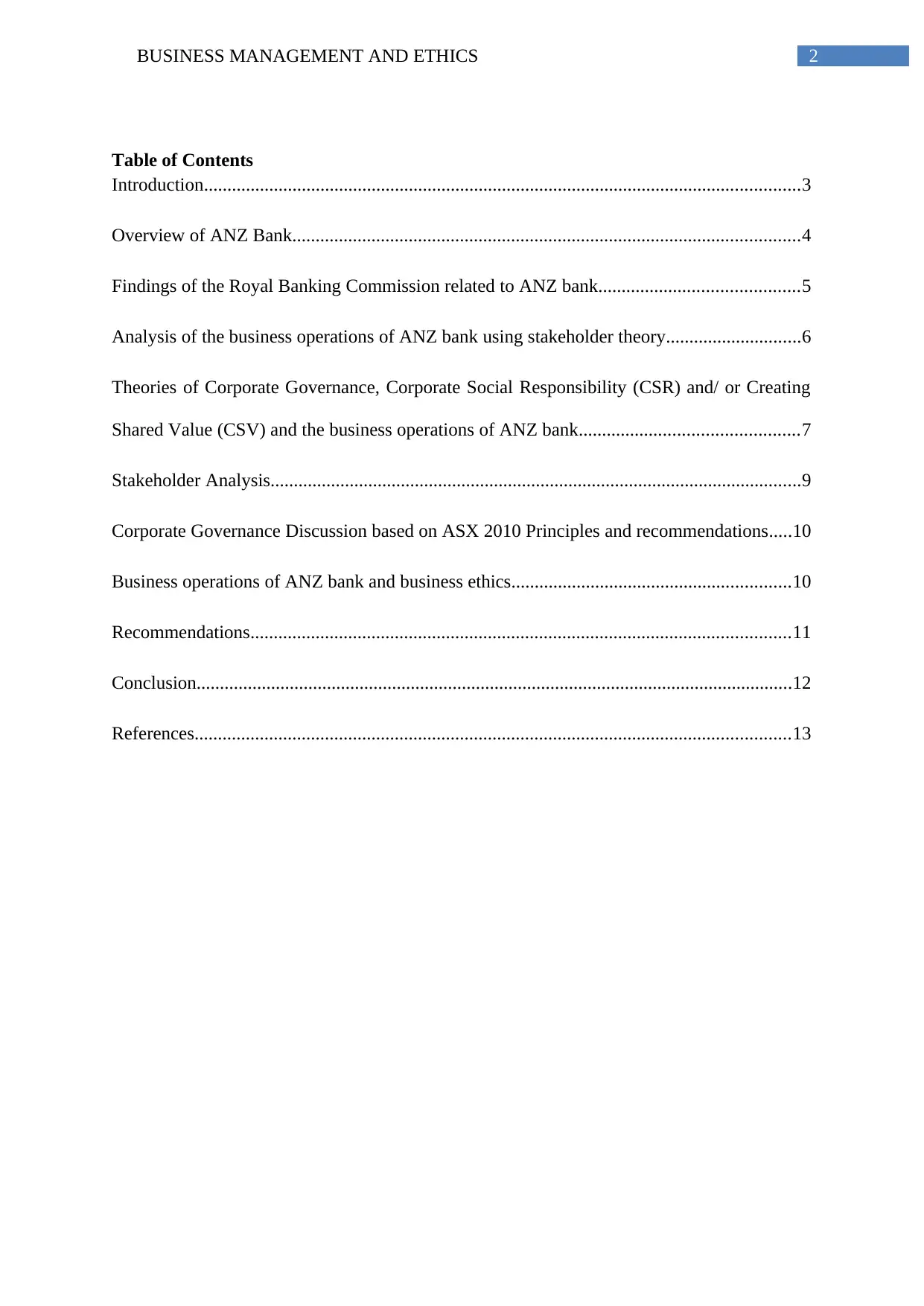
2BUSINESS MANAGEMENT AND ETHICS
Table of Contents
Introduction................................................................................................................................3
Overview of ANZ Bank.............................................................................................................4
Findings of the Royal Banking Commission related to ANZ bank...........................................5
Analysis of the business operations of ANZ bank using stakeholder theory.............................6
Theories of Corporate Governance, Corporate Social Responsibility (CSR) and/ or Creating
Shared Value (CSV) and the business operations of ANZ bank...............................................7
Stakeholder Analysis..................................................................................................................9
Corporate Governance Discussion based on ASX 2010 Principles and recommendations.....10
Business operations of ANZ bank and business ethics............................................................10
Recommendations....................................................................................................................11
Conclusion................................................................................................................................12
References................................................................................................................................13
Table of Contents
Introduction................................................................................................................................3
Overview of ANZ Bank.............................................................................................................4
Findings of the Royal Banking Commission related to ANZ bank...........................................5
Analysis of the business operations of ANZ bank using stakeholder theory.............................6
Theories of Corporate Governance, Corporate Social Responsibility (CSR) and/ or Creating
Shared Value (CSV) and the business operations of ANZ bank...............................................7
Stakeholder Analysis..................................................................................................................9
Corporate Governance Discussion based on ASX 2010 Principles and recommendations.....10
Business operations of ANZ bank and business ethics............................................................10
Recommendations....................................................................................................................11
Conclusion................................................................................................................................12
References................................................................................................................................13
⊘ This is a preview!⊘
Do you want full access?
Subscribe today to unlock all pages.

Trusted by 1+ million students worldwide
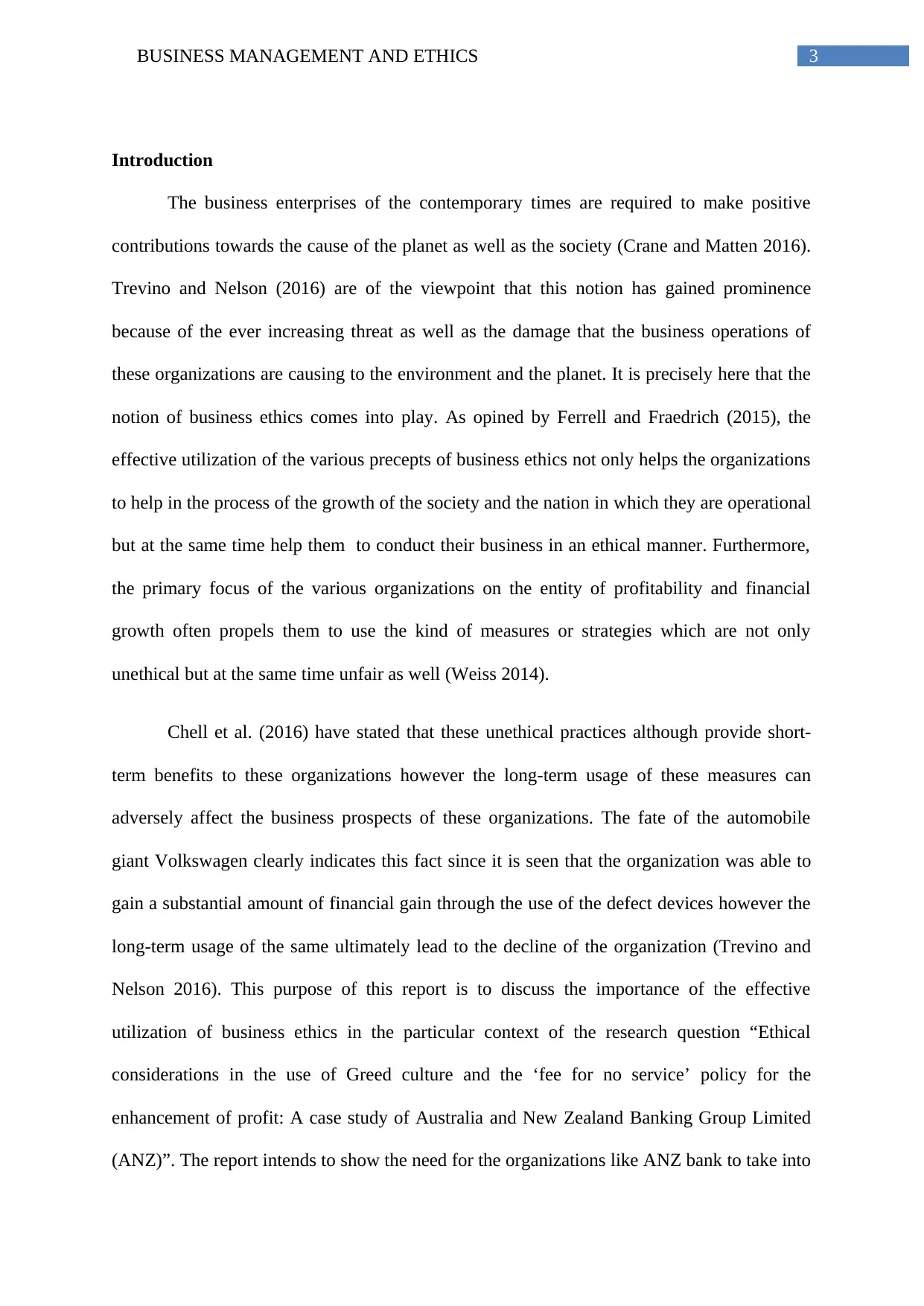
3BUSINESS MANAGEMENT AND ETHICS
Introduction
The business enterprises of the contemporary times are required to make positive
contributions towards the cause of the planet as well as the society (Crane and Matten 2016).
Trevino and Nelson (2016) are of the viewpoint that this notion has gained prominence
because of the ever increasing threat as well as the damage that the business operations of
these organizations are causing to the environment and the planet. It is precisely here that the
notion of business ethics comes into play. As opined by Ferrell and Fraedrich (2015), the
effective utilization of the various precepts of business ethics not only helps the organizations
to help in the process of the growth of the society and the nation in which they are operational
but at the same time help them to conduct their business in an ethical manner. Furthermore,
the primary focus of the various organizations on the entity of profitability and financial
growth often propels them to use the kind of measures or strategies which are not only
unethical but at the same time unfair as well (Weiss 2014).
Chell et al. (2016) have stated that these unethical practices although provide short-
term benefits to these organizations however the long-term usage of these measures can
adversely affect the business prospects of these organizations. The fate of the automobile
giant Volkswagen clearly indicates this fact since it is seen that the organization was able to
gain a substantial amount of financial gain through the use of the defect devices however the
long-term usage of the same ultimately lead to the decline of the organization (Trevino and
Nelson 2016). This purpose of this report is to discuss the importance of the effective
utilization of business ethics in the particular context of the research question “Ethical
considerations in the use of Greed culture and the ‘fee for no service’ policy for the
enhancement of profit: A case study of Australia and New Zealand Banking Group Limited
(ANZ)”. The report intends to show the need for the organizations like ANZ bank to take into
Introduction
The business enterprises of the contemporary times are required to make positive
contributions towards the cause of the planet as well as the society (Crane and Matten 2016).
Trevino and Nelson (2016) are of the viewpoint that this notion has gained prominence
because of the ever increasing threat as well as the damage that the business operations of
these organizations are causing to the environment and the planet. It is precisely here that the
notion of business ethics comes into play. As opined by Ferrell and Fraedrich (2015), the
effective utilization of the various precepts of business ethics not only helps the organizations
to help in the process of the growth of the society and the nation in which they are operational
but at the same time help them to conduct their business in an ethical manner. Furthermore,
the primary focus of the various organizations on the entity of profitability and financial
growth often propels them to use the kind of measures or strategies which are not only
unethical but at the same time unfair as well (Weiss 2014).
Chell et al. (2016) have stated that these unethical practices although provide short-
term benefits to these organizations however the long-term usage of these measures can
adversely affect the business prospects of these organizations. The fate of the automobile
giant Volkswagen clearly indicates this fact since it is seen that the organization was able to
gain a substantial amount of financial gain through the use of the defect devices however the
long-term usage of the same ultimately lead to the decline of the organization (Trevino and
Nelson 2016). This purpose of this report is to discuss the importance of the effective
utilization of business ethics in the particular context of the research question “Ethical
considerations in the use of Greed culture and the ‘fee for no service’ policy for the
enhancement of profit: A case study of Australia and New Zealand Banking Group Limited
(ANZ)”. The report intends to show the need for the organizations like ANZ bank to take into
Paraphrase This Document
Need a fresh take? Get an instant paraphrase of this document with our AI Paraphraser
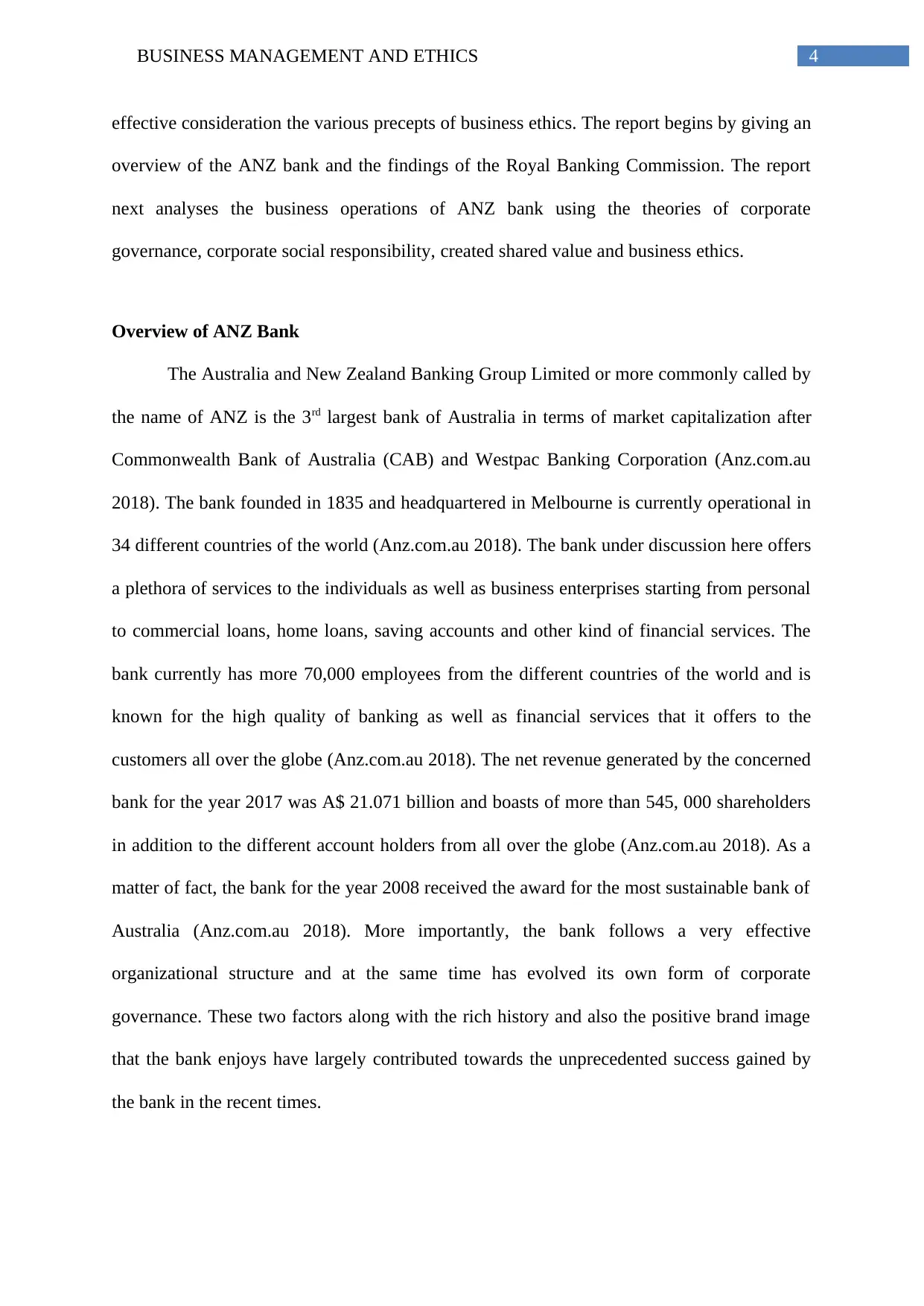
4BUSINESS MANAGEMENT AND ETHICS
effective consideration the various precepts of business ethics. The report begins by giving an
overview of the ANZ bank and the findings of the Royal Banking Commission. The report
next analyses the business operations of ANZ bank using the theories of corporate
governance, corporate social responsibility, created shared value and business ethics.
Overview of ANZ Bank
The Australia and New Zealand Banking Group Limited or more commonly called by
the name of ANZ is the 3rd largest bank of Australia in terms of market capitalization after
Commonwealth Bank of Australia (CAB) and Westpac Banking Corporation (Anz.com.au
2018). The bank founded in 1835 and headquartered in Melbourne is currently operational in
34 different countries of the world (Anz.com.au 2018). The bank under discussion here offers
a plethora of services to the individuals as well as business enterprises starting from personal
to commercial loans, home loans, saving accounts and other kind of financial services. The
bank currently has more 70,000 employees from the different countries of the world and is
known for the high quality of banking as well as financial services that it offers to the
customers all over the globe (Anz.com.au 2018). The net revenue generated by the concerned
bank for the year 2017 was A$ 21.071 billion and boasts of more than 545, 000 shareholders
in addition to the different account holders from all over the globe (Anz.com.au 2018). As a
matter of fact, the bank for the year 2008 received the award for the most sustainable bank of
Australia (Anz.com.au 2018). More importantly, the bank follows a very effective
organizational structure and at the same time has evolved its own form of corporate
governance. These two factors along with the rich history and also the positive brand image
that the bank enjoys have largely contributed towards the unprecedented success gained by
the bank in the recent times.
effective consideration the various precepts of business ethics. The report begins by giving an
overview of the ANZ bank and the findings of the Royal Banking Commission. The report
next analyses the business operations of ANZ bank using the theories of corporate
governance, corporate social responsibility, created shared value and business ethics.
Overview of ANZ Bank
The Australia and New Zealand Banking Group Limited or more commonly called by
the name of ANZ is the 3rd largest bank of Australia in terms of market capitalization after
Commonwealth Bank of Australia (CAB) and Westpac Banking Corporation (Anz.com.au
2018). The bank founded in 1835 and headquartered in Melbourne is currently operational in
34 different countries of the world (Anz.com.au 2018). The bank under discussion here offers
a plethora of services to the individuals as well as business enterprises starting from personal
to commercial loans, home loans, saving accounts and other kind of financial services. The
bank currently has more 70,000 employees from the different countries of the world and is
known for the high quality of banking as well as financial services that it offers to the
customers all over the globe (Anz.com.au 2018). The net revenue generated by the concerned
bank for the year 2017 was A$ 21.071 billion and boasts of more than 545, 000 shareholders
in addition to the different account holders from all over the globe (Anz.com.au 2018). As a
matter of fact, the bank for the year 2008 received the award for the most sustainable bank of
Australia (Anz.com.au 2018). More importantly, the bank follows a very effective
organizational structure and at the same time has evolved its own form of corporate
governance. These two factors along with the rich history and also the positive brand image
that the bank enjoys have largely contributed towards the unprecedented success gained by
the bank in the recent times.
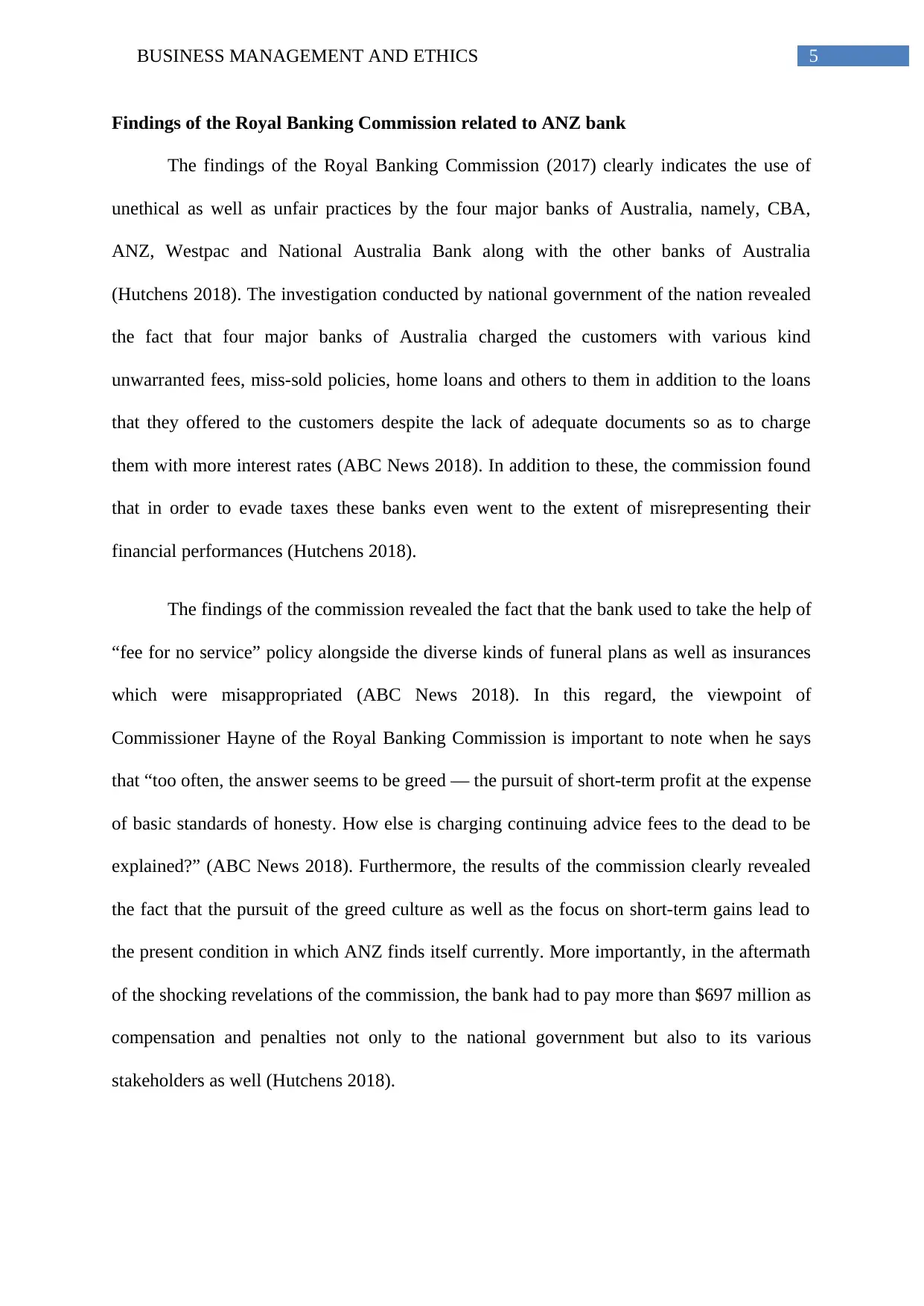
5BUSINESS MANAGEMENT AND ETHICS
Findings of the Royal Banking Commission related to ANZ bank
The findings of the Royal Banking Commission (2017) clearly indicates the use of
unethical as well as unfair practices by the four major banks of Australia, namely, CBA,
ANZ, Westpac and National Australia Bank along with the other banks of Australia
(Hutchens 2018). The investigation conducted by national government of the nation revealed
the fact that four major banks of Australia charged the customers with various kind
unwarranted fees, miss-sold policies, home loans and others to them in addition to the loans
that they offered to the customers despite the lack of adequate documents so as to charge
them with more interest rates (ABC News 2018). In addition to these, the commission found
that in order to evade taxes these banks even went to the extent of misrepresenting their
financial performances (Hutchens 2018).
The findings of the commission revealed the fact that the bank used to take the help of
“fee for no service” policy alongside the diverse kinds of funeral plans as well as insurances
which were misappropriated (ABC News 2018). In this regard, the viewpoint of
Commissioner Hayne of the Royal Banking Commission is important to note when he says
that “too often, the answer seems to be greed — the pursuit of short-term profit at the expense
of basic standards of honesty. How else is charging continuing advice fees to the dead to be
explained?” (ABC News 2018). Furthermore, the results of the commission clearly revealed
the fact that the pursuit of the greed culture as well as the focus on short-term gains lead to
the present condition in which ANZ finds itself currently. More importantly, in the aftermath
of the shocking revelations of the commission, the bank had to pay more than $697 million as
compensation and penalties not only to the national government but also to its various
stakeholders as well (Hutchens 2018).
Findings of the Royal Banking Commission related to ANZ bank
The findings of the Royal Banking Commission (2017) clearly indicates the use of
unethical as well as unfair practices by the four major banks of Australia, namely, CBA,
ANZ, Westpac and National Australia Bank along with the other banks of Australia
(Hutchens 2018). The investigation conducted by national government of the nation revealed
the fact that four major banks of Australia charged the customers with various kind
unwarranted fees, miss-sold policies, home loans and others to them in addition to the loans
that they offered to the customers despite the lack of adequate documents so as to charge
them with more interest rates (ABC News 2018). In addition to these, the commission found
that in order to evade taxes these banks even went to the extent of misrepresenting their
financial performances (Hutchens 2018).
The findings of the commission revealed the fact that the bank used to take the help of
“fee for no service” policy alongside the diverse kinds of funeral plans as well as insurances
which were misappropriated (ABC News 2018). In this regard, the viewpoint of
Commissioner Hayne of the Royal Banking Commission is important to note when he says
that “too often, the answer seems to be greed — the pursuit of short-term profit at the expense
of basic standards of honesty. How else is charging continuing advice fees to the dead to be
explained?” (ABC News 2018). Furthermore, the results of the commission clearly revealed
the fact that the pursuit of the greed culture as well as the focus on short-term gains lead to
the present condition in which ANZ finds itself currently. More importantly, in the aftermath
of the shocking revelations of the commission, the bank had to pay more than $697 million as
compensation and penalties not only to the national government but also to its various
stakeholders as well (Hutchens 2018).
⊘ This is a preview!⊘
Do you want full access?
Subscribe today to unlock all pages.

Trusted by 1+ million students worldwide
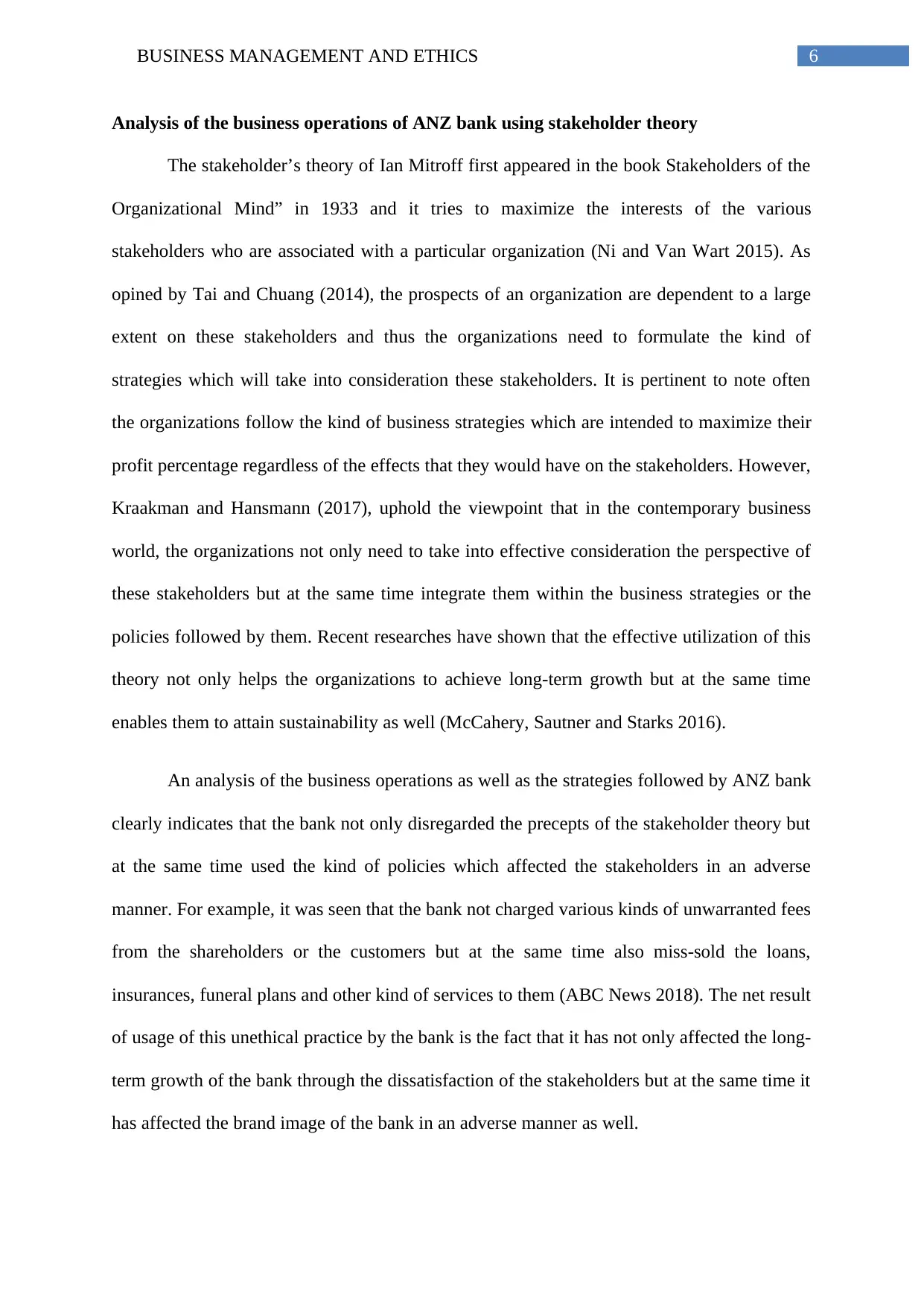
6BUSINESS MANAGEMENT AND ETHICS
Analysis of the business operations of ANZ bank using stakeholder theory
The stakeholder’s theory of Ian Mitroff first appeared in the book Stakeholders of the
Organizational Mind” in 1933 and it tries to maximize the interests of the various
stakeholders who are associated with a particular organization (Ni and Van Wart 2015). As
opined by Tai and Chuang (2014), the prospects of an organization are dependent to a large
extent on these stakeholders and thus the organizations need to formulate the kind of
strategies which will take into consideration these stakeholders. It is pertinent to note often
the organizations follow the kind of business strategies which are intended to maximize their
profit percentage regardless of the effects that they would have on the stakeholders. However,
Kraakman and Hansmann (2017), uphold the viewpoint that in the contemporary business
world, the organizations not only need to take into effective consideration the perspective of
these stakeholders but at the same time integrate them within the business strategies or the
policies followed by them. Recent researches have shown that the effective utilization of this
theory not only helps the organizations to achieve long-term growth but at the same time
enables them to attain sustainability as well (McCahery, Sautner and Starks 2016).
An analysis of the business operations as well as the strategies followed by ANZ bank
clearly indicates that the bank not only disregarded the precepts of the stakeholder theory but
at the same time used the kind of policies which affected the stakeholders in an adverse
manner. For example, it was seen that the bank not charged various kinds of unwarranted fees
from the shareholders or the customers but at the same time also miss-sold the loans,
insurances, funeral plans and other kind of services to them (ABC News 2018). The net result
of usage of this unethical practice by the bank is the fact that it has not only affected the long-
term growth of the bank through the dissatisfaction of the stakeholders but at the same time it
has affected the brand image of the bank in an adverse manner as well.
Analysis of the business operations of ANZ bank using stakeholder theory
The stakeholder’s theory of Ian Mitroff first appeared in the book Stakeholders of the
Organizational Mind” in 1933 and it tries to maximize the interests of the various
stakeholders who are associated with a particular organization (Ni and Van Wart 2015). As
opined by Tai and Chuang (2014), the prospects of an organization are dependent to a large
extent on these stakeholders and thus the organizations need to formulate the kind of
strategies which will take into consideration these stakeholders. It is pertinent to note often
the organizations follow the kind of business strategies which are intended to maximize their
profit percentage regardless of the effects that they would have on the stakeholders. However,
Kraakman and Hansmann (2017), uphold the viewpoint that in the contemporary business
world, the organizations not only need to take into effective consideration the perspective of
these stakeholders but at the same time integrate them within the business strategies or the
policies followed by them. Recent researches have shown that the effective utilization of this
theory not only helps the organizations to achieve long-term growth but at the same time
enables them to attain sustainability as well (McCahery, Sautner and Starks 2016).
An analysis of the business operations as well as the strategies followed by ANZ bank
clearly indicates that the bank not only disregarded the precepts of the stakeholder theory but
at the same time used the kind of policies which affected the stakeholders in an adverse
manner. For example, it was seen that the bank not charged various kinds of unwarranted fees
from the shareholders or the customers but at the same time also miss-sold the loans,
insurances, funeral plans and other kind of services to them (ABC News 2018). The net result
of usage of this unethical practice by the bank is the fact that it has not only affected the long-
term growth of the bank through the dissatisfaction of the stakeholders but at the same time it
has affected the brand image of the bank in an adverse manner as well.
Paraphrase This Document
Need a fresh take? Get an instant paraphrase of this document with our AI Paraphraser
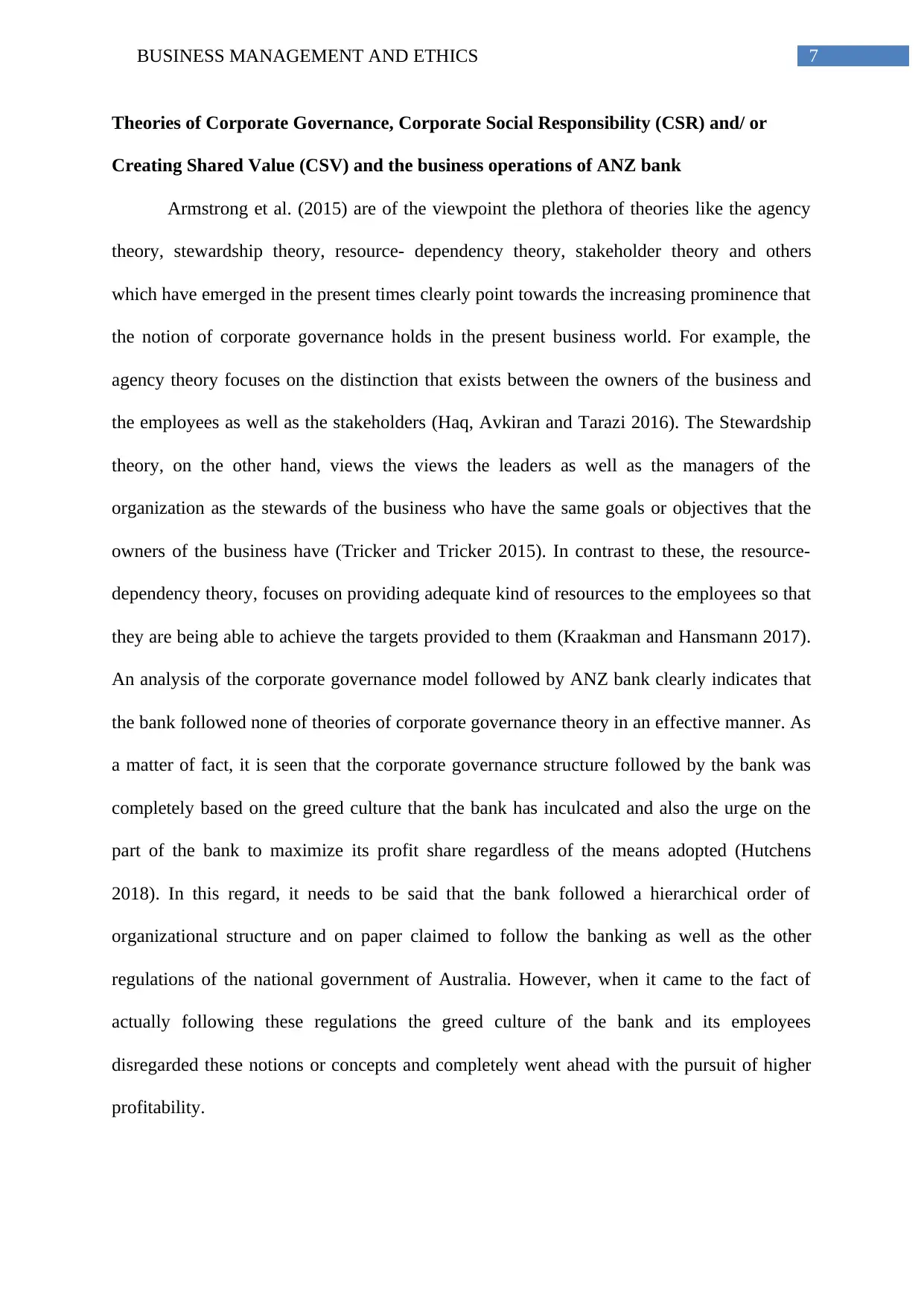
7BUSINESS MANAGEMENT AND ETHICS
Theories of Corporate Governance, Corporate Social Responsibility (CSR) and/ or
Creating Shared Value (CSV) and the business operations of ANZ bank
Armstrong et al. (2015) are of the viewpoint the plethora of theories like the agency
theory, stewardship theory, resource- dependency theory, stakeholder theory and others
which have emerged in the present times clearly point towards the increasing prominence that
the notion of corporate governance holds in the present business world. For example, the
agency theory focuses on the distinction that exists between the owners of the business and
the employees as well as the stakeholders (Haq, Avkiran and Tarazi 2016). The Stewardship
theory, on the other hand, views the views the leaders as well as the managers of the
organization as the stewards of the business who have the same goals or objectives that the
owners of the business have (Tricker and Tricker 2015). In contrast to these, the resource-
dependency theory, focuses on providing adequate kind of resources to the employees so that
they are being able to achieve the targets provided to them (Kraakman and Hansmann 2017).
An analysis of the corporate governance model followed by ANZ bank clearly indicates that
the bank followed none of theories of corporate governance theory in an effective manner. As
a matter of fact, it is seen that the corporate governance structure followed by the bank was
completely based on the greed culture that the bank has inculcated and also the urge on the
part of the bank to maximize its profit share regardless of the means adopted (Hutchens
2018). In this regard, it needs to be said that the bank followed a hierarchical order of
organizational structure and on paper claimed to follow the banking as well as the other
regulations of the national government of Australia. However, when it came to the fact of
actually following these regulations the greed culture of the bank and its employees
disregarded these notions or concepts and completely went ahead with the pursuit of higher
profitability.
Theories of Corporate Governance, Corporate Social Responsibility (CSR) and/ or
Creating Shared Value (CSV) and the business operations of ANZ bank
Armstrong et al. (2015) are of the viewpoint the plethora of theories like the agency
theory, stewardship theory, resource- dependency theory, stakeholder theory and others
which have emerged in the present times clearly point towards the increasing prominence that
the notion of corporate governance holds in the present business world. For example, the
agency theory focuses on the distinction that exists between the owners of the business and
the employees as well as the stakeholders (Haq, Avkiran and Tarazi 2016). The Stewardship
theory, on the other hand, views the views the leaders as well as the managers of the
organization as the stewards of the business who have the same goals or objectives that the
owners of the business have (Tricker and Tricker 2015). In contrast to these, the resource-
dependency theory, focuses on providing adequate kind of resources to the employees so that
they are being able to achieve the targets provided to them (Kraakman and Hansmann 2017).
An analysis of the corporate governance model followed by ANZ bank clearly indicates that
the bank followed none of theories of corporate governance theory in an effective manner. As
a matter of fact, it is seen that the corporate governance structure followed by the bank was
completely based on the greed culture that the bank has inculcated and also the urge on the
part of the bank to maximize its profit share regardless of the means adopted (Hutchens
2018). In this regard, it needs to be said that the bank followed a hierarchical order of
organizational structure and on paper claimed to follow the banking as well as the other
regulations of the national government of Australia. However, when it came to the fact of
actually following these regulations the greed culture of the bank and its employees
disregarded these notions or concepts and completely went ahead with the pursuit of higher
profitability.
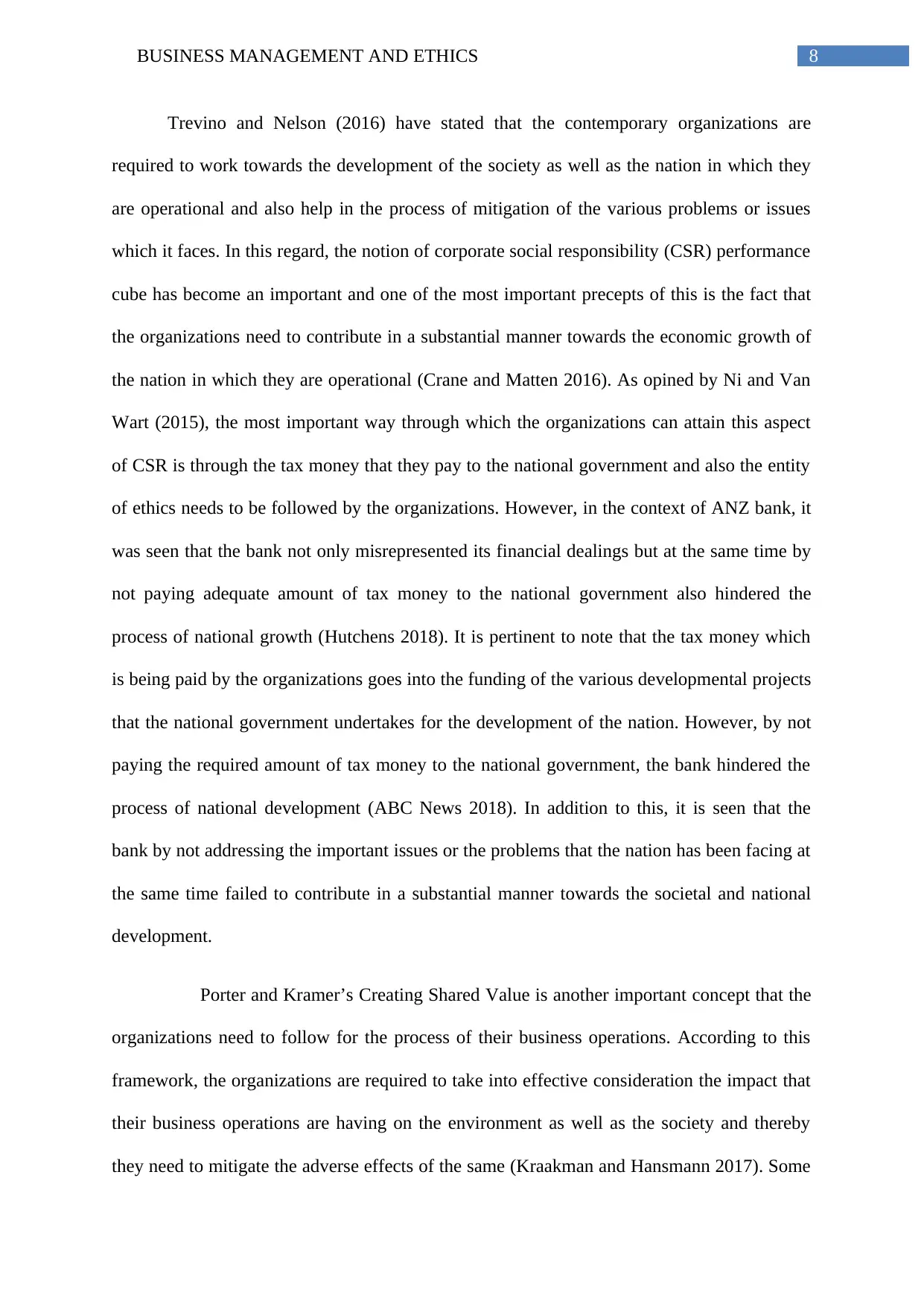
8BUSINESS MANAGEMENT AND ETHICS
Trevino and Nelson (2016) have stated that the contemporary organizations are
required to work towards the development of the society as well as the nation in which they
are operational and also help in the process of mitigation of the various problems or issues
which it faces. In this regard, the notion of corporate social responsibility (CSR) performance
cube has become an important and one of the most important precepts of this is the fact that
the organizations need to contribute in a substantial manner towards the economic growth of
the nation in which they are operational (Crane and Matten 2016). As opined by Ni and Van
Wart (2015), the most important way through which the organizations can attain this aspect
of CSR is through the tax money that they pay to the national government and also the entity
of ethics needs to be followed by the organizations. However, in the context of ANZ bank, it
was seen that the bank not only misrepresented its financial dealings but at the same time by
not paying adequate amount of tax money to the national government also hindered the
process of national growth (Hutchens 2018). It is pertinent to note that the tax money which
is being paid by the organizations goes into the funding of the various developmental projects
that the national government undertakes for the development of the nation. However, by not
paying the required amount of tax money to the national government, the bank hindered the
process of national development (ABC News 2018). In addition to this, it is seen that the
bank by not addressing the important issues or the problems that the nation has been facing at
the same time failed to contribute in a substantial manner towards the societal and national
development.
Porter and Kramer’s Creating Shared Value is another important concept that the
organizations need to follow for the process of their business operations. According to this
framework, the organizations are required to take into effective consideration the impact that
their business operations are having on the environment as well as the society and thereby
they need to mitigate the adverse effects of the same (Kraakman and Hansmann 2017). Some
Trevino and Nelson (2016) have stated that the contemporary organizations are
required to work towards the development of the society as well as the nation in which they
are operational and also help in the process of mitigation of the various problems or issues
which it faces. In this regard, the notion of corporate social responsibility (CSR) performance
cube has become an important and one of the most important precepts of this is the fact that
the organizations need to contribute in a substantial manner towards the economic growth of
the nation in which they are operational (Crane and Matten 2016). As opined by Ni and Van
Wart (2015), the most important way through which the organizations can attain this aspect
of CSR is through the tax money that they pay to the national government and also the entity
of ethics needs to be followed by the organizations. However, in the context of ANZ bank, it
was seen that the bank not only misrepresented its financial dealings but at the same time by
not paying adequate amount of tax money to the national government also hindered the
process of national growth (Hutchens 2018). It is pertinent to note that the tax money which
is being paid by the organizations goes into the funding of the various developmental projects
that the national government undertakes for the development of the nation. However, by not
paying the required amount of tax money to the national government, the bank hindered the
process of national development (ABC News 2018). In addition to this, it is seen that the
bank by not addressing the important issues or the problems that the nation has been facing at
the same time failed to contribute in a substantial manner towards the societal and national
development.
Porter and Kramer’s Creating Shared Value is another important concept that the
organizations need to follow for the process of their business operations. According to this
framework, the organizations are required to take into effective consideration the impact that
their business operations are having on the environment as well as the society and thereby
they need to mitigate the adverse effects of the same (Kraakman and Hansmann 2017). Some
⊘ This is a preview!⊘
Do you want full access?
Subscribe today to unlock all pages.

Trusted by 1+ million students worldwide
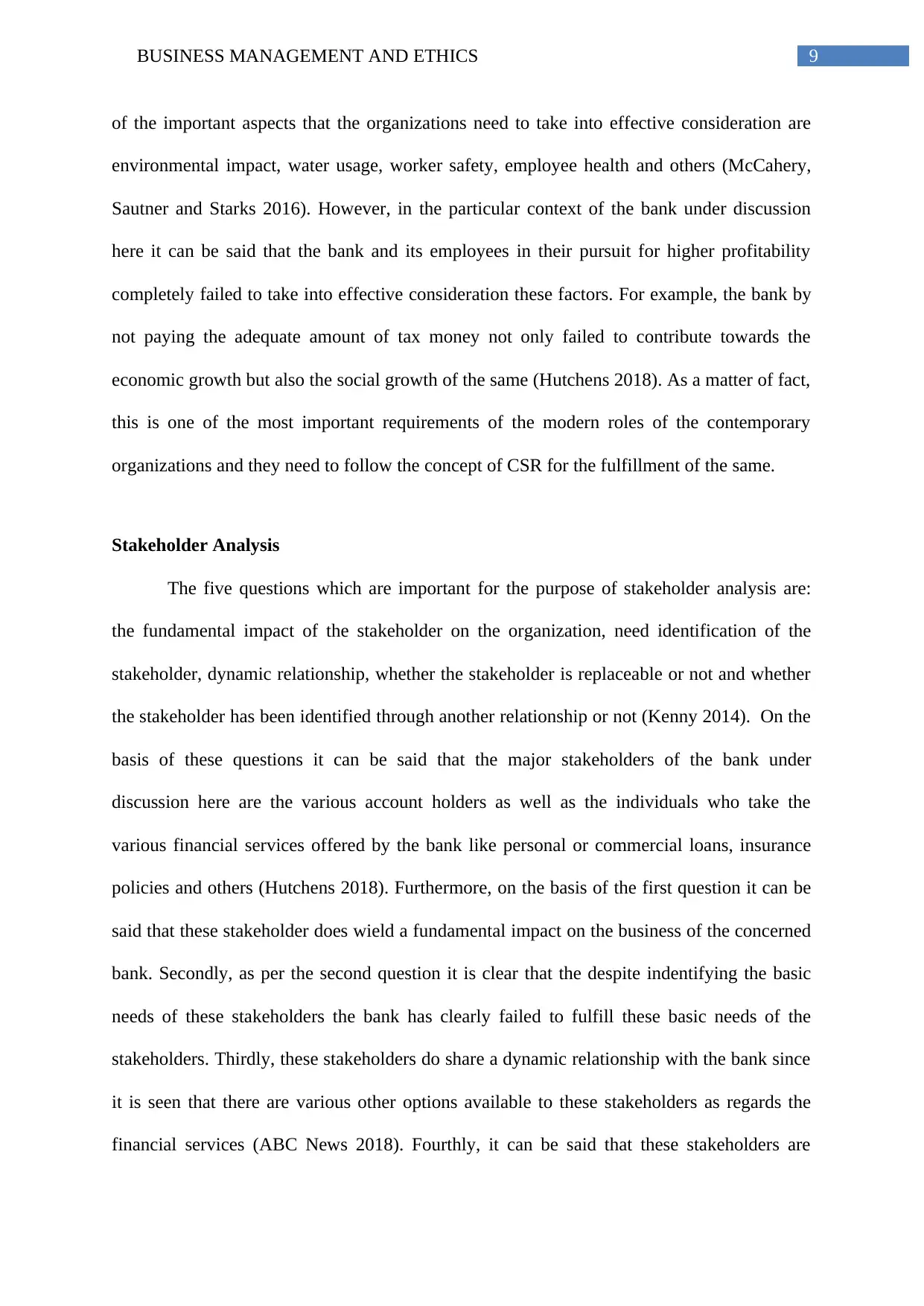
9BUSINESS MANAGEMENT AND ETHICS
of the important aspects that the organizations need to take into effective consideration are
environmental impact, water usage, worker safety, employee health and others (McCahery,
Sautner and Starks 2016). However, in the particular context of the bank under discussion
here it can be said that the bank and its employees in their pursuit for higher profitability
completely failed to take into effective consideration these factors. For example, the bank by
not paying the adequate amount of tax money not only failed to contribute towards the
economic growth but also the social growth of the same (Hutchens 2018). As a matter of fact,
this is one of the most important requirements of the modern roles of the contemporary
organizations and they need to follow the concept of CSR for the fulfillment of the same.
Stakeholder Analysis
The five questions which are important for the purpose of stakeholder analysis are:
the fundamental impact of the stakeholder on the organization, need identification of the
stakeholder, dynamic relationship, whether the stakeholder is replaceable or not and whether
the stakeholder has been identified through another relationship or not (Kenny 2014). On the
basis of these questions it can be said that the major stakeholders of the bank under
discussion here are the various account holders as well as the individuals who take the
various financial services offered by the bank like personal or commercial loans, insurance
policies and others (Hutchens 2018). Furthermore, on the basis of the first question it can be
said that these stakeholder does wield a fundamental impact on the business of the concerned
bank. Secondly, as per the second question it is clear that the despite indentifying the basic
needs of these stakeholders the bank has clearly failed to fulfill these basic needs of the
stakeholders. Thirdly, these stakeholders do share a dynamic relationship with the bank since
it is seen that there are various other options available to these stakeholders as regards the
financial services (ABC News 2018). Fourthly, it can be said that these stakeholders are
of the important aspects that the organizations need to take into effective consideration are
environmental impact, water usage, worker safety, employee health and others (McCahery,
Sautner and Starks 2016). However, in the particular context of the bank under discussion
here it can be said that the bank and its employees in their pursuit for higher profitability
completely failed to take into effective consideration these factors. For example, the bank by
not paying the adequate amount of tax money not only failed to contribute towards the
economic growth but also the social growth of the same (Hutchens 2018). As a matter of fact,
this is one of the most important requirements of the modern roles of the contemporary
organizations and they need to follow the concept of CSR for the fulfillment of the same.
Stakeholder Analysis
The five questions which are important for the purpose of stakeholder analysis are:
the fundamental impact of the stakeholder on the organization, need identification of the
stakeholder, dynamic relationship, whether the stakeholder is replaceable or not and whether
the stakeholder has been identified through another relationship or not (Kenny 2014). On the
basis of these questions it can be said that the major stakeholders of the bank under
discussion here are the various account holders as well as the individuals who take the
various financial services offered by the bank like personal or commercial loans, insurance
policies and others (Hutchens 2018). Furthermore, on the basis of the first question it can be
said that these stakeholder does wield a fundamental impact on the business of the concerned
bank. Secondly, as per the second question it is clear that the despite indentifying the basic
needs of these stakeholders the bank has clearly failed to fulfill these basic needs of the
stakeholders. Thirdly, these stakeholders do share a dynamic relationship with the bank since
it is seen that there are various other options available to these stakeholders as regards the
financial services (ABC News 2018). Fourthly, it can be said that these stakeholders are
Paraphrase This Document
Need a fresh take? Get an instant paraphrase of this document with our AI Paraphraser
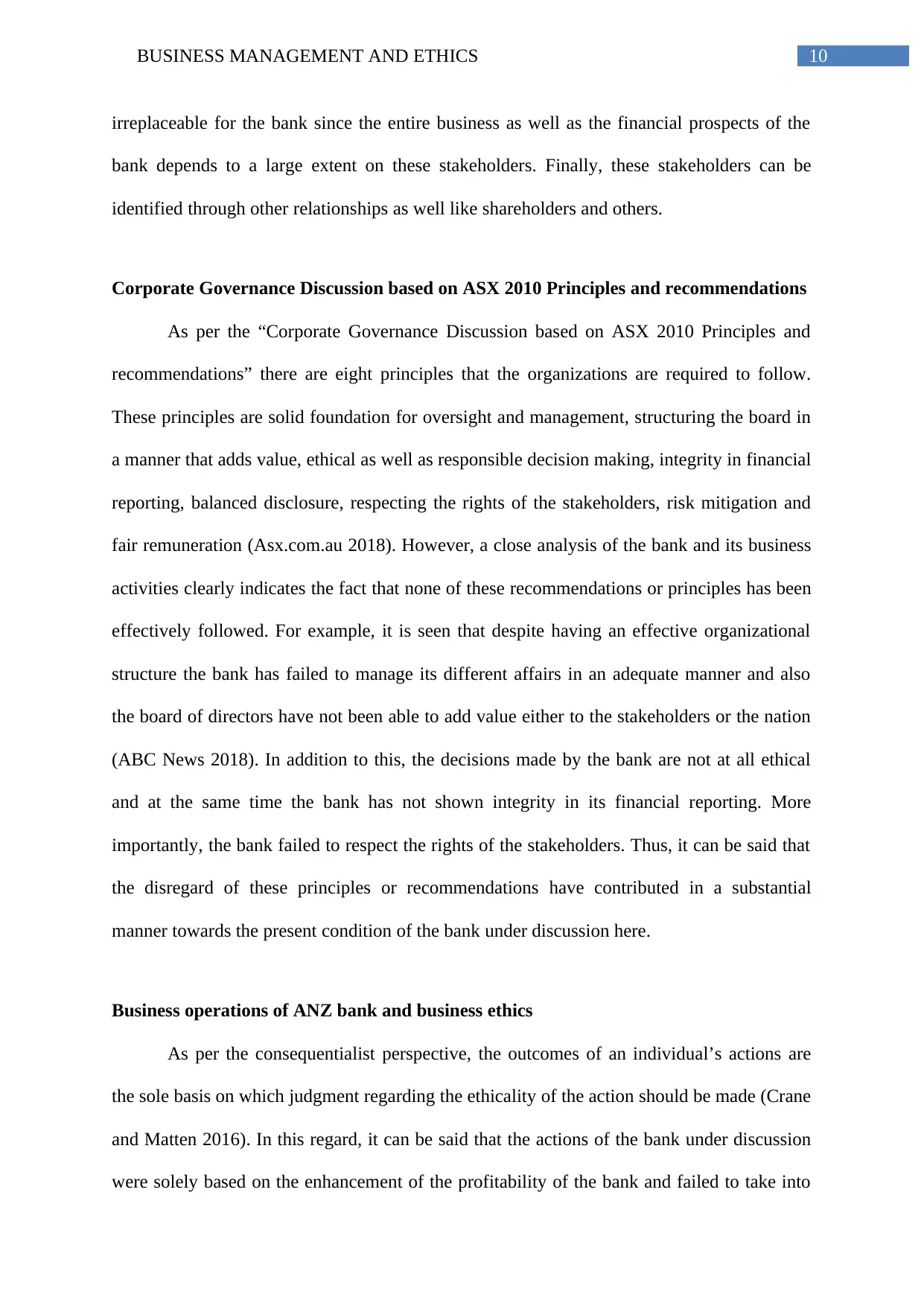
10BUSINESS MANAGEMENT AND ETHICS
irreplaceable for the bank since the entire business as well as the financial prospects of the
bank depends to a large extent on these stakeholders. Finally, these stakeholders can be
identified through other relationships as well like shareholders and others.
Corporate Governance Discussion based on ASX 2010 Principles and recommendations
As per the “Corporate Governance Discussion based on ASX 2010 Principles and
recommendations” there are eight principles that the organizations are required to follow.
These principles are solid foundation for oversight and management, structuring the board in
a manner that adds value, ethical as well as responsible decision making, integrity in financial
reporting, balanced disclosure, respecting the rights of the stakeholders, risk mitigation and
fair remuneration (Asx.com.au 2018). However, a close analysis of the bank and its business
activities clearly indicates the fact that none of these recommendations or principles has been
effectively followed. For example, it is seen that despite having an effective organizational
structure the bank has failed to manage its different affairs in an adequate manner and also
the board of directors have not been able to add value either to the stakeholders or the nation
(ABC News 2018). In addition to this, the decisions made by the bank are not at all ethical
and at the same time the bank has not shown integrity in its financial reporting. More
importantly, the bank failed to respect the rights of the stakeholders. Thus, it can be said that
the disregard of these principles or recommendations have contributed in a substantial
manner towards the present condition of the bank under discussion here.
Business operations of ANZ bank and business ethics
As per the consequentialist perspective, the outcomes of an individual’s actions are
the sole basis on which judgment regarding the ethicality of the action should be made (Crane
and Matten 2016). In this regard, it can be said that the actions of the bank under discussion
were solely based on the enhancement of the profitability of the bank and failed to take into
irreplaceable for the bank since the entire business as well as the financial prospects of the
bank depends to a large extent on these stakeholders. Finally, these stakeholders can be
identified through other relationships as well like shareholders and others.
Corporate Governance Discussion based on ASX 2010 Principles and recommendations
As per the “Corporate Governance Discussion based on ASX 2010 Principles and
recommendations” there are eight principles that the organizations are required to follow.
These principles are solid foundation for oversight and management, structuring the board in
a manner that adds value, ethical as well as responsible decision making, integrity in financial
reporting, balanced disclosure, respecting the rights of the stakeholders, risk mitigation and
fair remuneration (Asx.com.au 2018). However, a close analysis of the bank and its business
activities clearly indicates the fact that none of these recommendations or principles has been
effectively followed. For example, it is seen that despite having an effective organizational
structure the bank has failed to manage its different affairs in an adequate manner and also
the board of directors have not been able to add value either to the stakeholders or the nation
(ABC News 2018). In addition to this, the decisions made by the bank are not at all ethical
and at the same time the bank has not shown integrity in its financial reporting. More
importantly, the bank failed to respect the rights of the stakeholders. Thus, it can be said that
the disregard of these principles or recommendations have contributed in a substantial
manner towards the present condition of the bank under discussion here.
Business operations of ANZ bank and business ethics
As per the consequentialist perspective, the outcomes of an individual’s actions are
the sole basis on which judgment regarding the ethicality of the action should be made (Crane
and Matten 2016). In this regard, it can be said that the actions of the bank under discussion
were solely based on the enhancement of the profitability of the bank and failed to take into
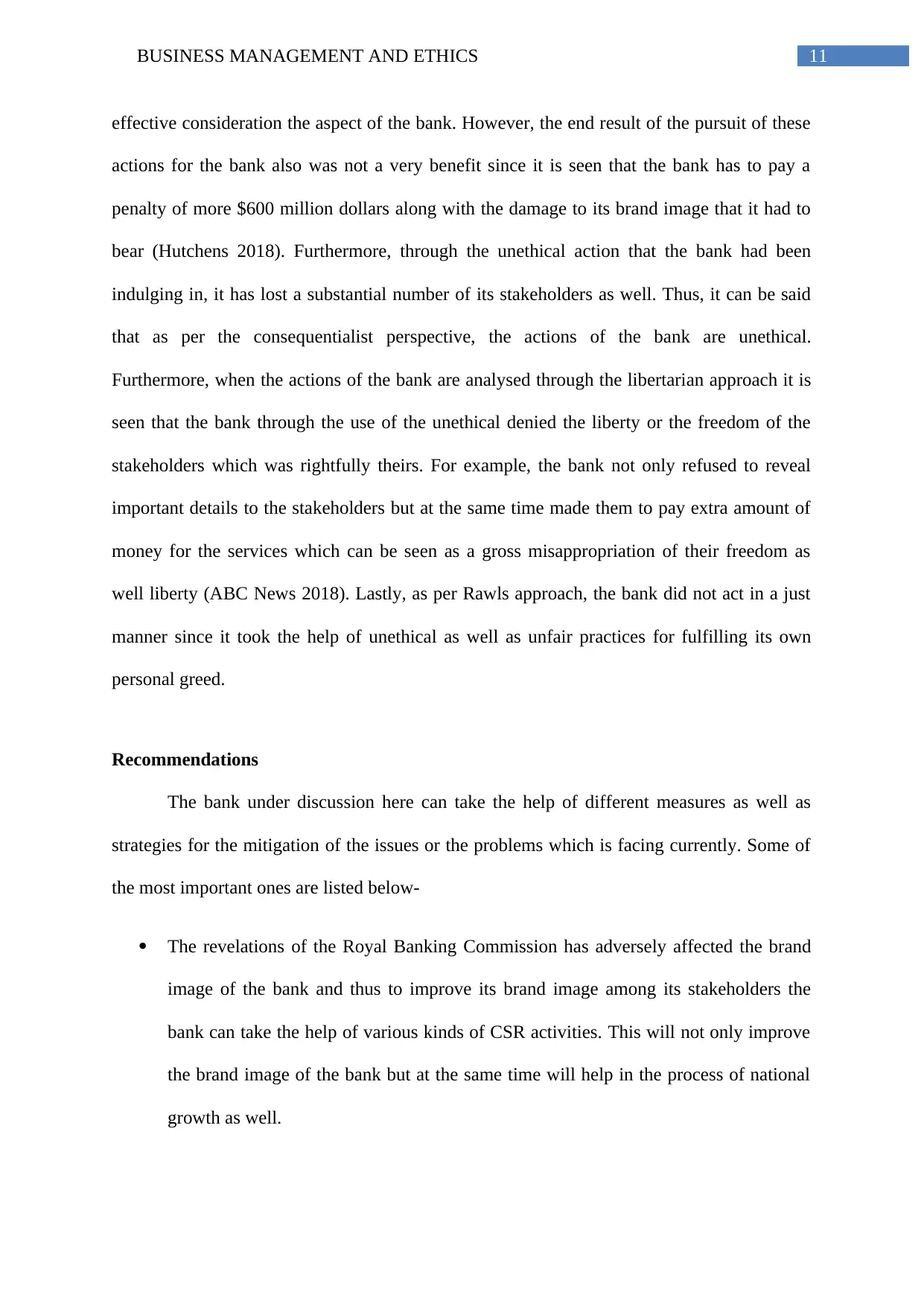
11BUSINESS MANAGEMENT AND ETHICS
effective consideration the aspect of the bank. However, the end result of the pursuit of these
actions for the bank also was not a very benefit since it is seen that the bank has to pay a
penalty of more $600 million dollars along with the damage to its brand image that it had to
bear (Hutchens 2018). Furthermore, through the unethical action that the bank had been
indulging in, it has lost a substantial number of its stakeholders as well. Thus, it can be said
that as per the consequentialist perspective, the actions of the bank are unethical.
Furthermore, when the actions of the bank are analysed through the libertarian approach it is
seen that the bank through the use of the unethical denied the liberty or the freedom of the
stakeholders which was rightfully theirs. For example, the bank not only refused to reveal
important details to the stakeholders but at the same time made them to pay extra amount of
money for the services which can be seen as a gross misappropriation of their freedom as
well liberty (ABC News 2018). Lastly, as per Rawls approach, the bank did not act in a just
manner since it took the help of unethical as well as unfair practices for fulfilling its own
personal greed.
Recommendations
The bank under discussion here can take the help of different measures as well as
strategies for the mitigation of the issues or the problems which is facing currently. Some of
the most important ones are listed below-
The revelations of the Royal Banking Commission has adversely affected the brand
image of the bank and thus to improve its brand image among its stakeholders the
bank can take the help of various kinds of CSR activities. This will not only improve
the brand image of the bank but at the same time will help in the process of national
growth as well.
effective consideration the aspect of the bank. However, the end result of the pursuit of these
actions for the bank also was not a very benefit since it is seen that the bank has to pay a
penalty of more $600 million dollars along with the damage to its brand image that it had to
bear (Hutchens 2018). Furthermore, through the unethical action that the bank had been
indulging in, it has lost a substantial number of its stakeholders as well. Thus, it can be said
that as per the consequentialist perspective, the actions of the bank are unethical.
Furthermore, when the actions of the bank are analysed through the libertarian approach it is
seen that the bank through the use of the unethical denied the liberty or the freedom of the
stakeholders which was rightfully theirs. For example, the bank not only refused to reveal
important details to the stakeholders but at the same time made them to pay extra amount of
money for the services which can be seen as a gross misappropriation of their freedom as
well liberty (ABC News 2018). Lastly, as per Rawls approach, the bank did not act in a just
manner since it took the help of unethical as well as unfair practices for fulfilling its own
personal greed.
Recommendations
The bank under discussion here can take the help of different measures as well as
strategies for the mitigation of the issues or the problems which is facing currently. Some of
the most important ones are listed below-
The revelations of the Royal Banking Commission has adversely affected the brand
image of the bank and thus to improve its brand image among its stakeholders the
bank can take the help of various kinds of CSR activities. This will not only improve
the brand image of the bank but at the same time will help in the process of national
growth as well.
⊘ This is a preview!⊘
Do you want full access?
Subscribe today to unlock all pages.

Trusted by 1+ million students worldwide
1 out of 15
Related Documents
Your All-in-One AI-Powered Toolkit for Academic Success.
+13062052269
info@desklib.com
Available 24*7 on WhatsApp / Email
![[object Object]](/_next/static/media/star-bottom.7253800d.svg)
Unlock your academic potential
Copyright © 2020–2026 A2Z Services. All Rights Reserved. Developed and managed by ZUCOL.




